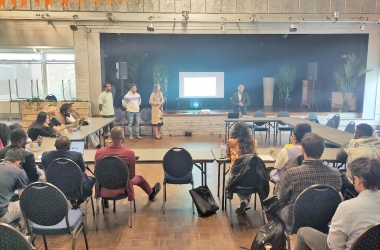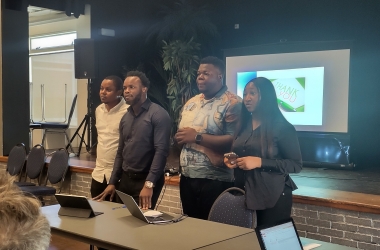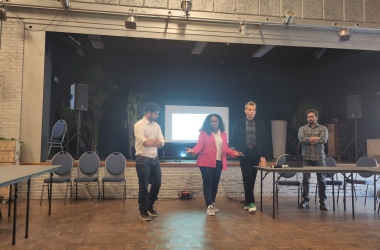Students Collaborate with Zuidoost Werkt to Address Unemployment Challenges

Wittenborg Students Highlight Key Challenges for Project Week
On 17 June, students from Wittenborg's EBA (Entrepreneurial Business Administration) and MBA (Master of Business Administration) programmes presented their research findings for a special Project Week in collaboration with Zuidoost Werkt, a local job centre supported by Randstad, the Johan Cruyff Arena and the city of Amsterdam.
At the conclusion of the Project Week, students delivered a summary of their research to Zuidoost Werkt. This included a database detailing 85 job training programmes to be integrated into the job centre’s network, along with a PowerPoint presentation in Dutch outlining their key findings.
Senior Lecturer Amy Abdou expressed her satisfaction with the students’ work, stating, “The organisation was thrilled to receive the output of the students’ research and were impressed by the quality and depth of the presentations.”

Unveiling critical insights
The research undertaken by the students shed light on several factors contributing to high unemployment rates in Amsterdam Zuidoost. Armed with a database provided by Randstad Market Intelligence, students scrutinised all listed job vacancies in the district from 2022-2023. Additionally, Zuidoost Werkt tasked students with identifying available free or employer-paid training programmes for job seekers and entrepreneurs in the area.
Students took varied approaches: some conducted broad surveys of available resources, while others focused on sectors facing the toughest recruitment challenges. They interviewed job seekers and entrepreneurs to understand their needs and pinpoint gaps in existing services and training programmes.
Among the findings, students discovered that 90% of job vacancies in Amsterdam Zuidoost were concentrated in four sectors: Consumer Discretionary, Financials, Healthcare and IT. Despite a national decline in job openings between 2022-2023, Amsterdam Zuidoost experienced a decline more than twice the national average. Moreover, nearly two-thirds of these vacancies required a college or university degree, highlighting a significant “labour market mismatch”, given that only 30% of residents hold such qualifications.

Student voices
Reflecting on the impact of the project, Solomon Audu, an MBA student from Nigeria, remarked, “Initially, I viewed the project week as merely an assignment. However, I realised its potential to drive positive change for Amsterdam Zuidoost residents and beyond.”
Audu was part of a team focused on resources available for job seekers seeking retraining opportunities. “Our methodology centred on six key sectors: Energy Transition, Construction, Information Technology, Healthcare, Childcare and Education,” he explained. Each team member researched 15 relevant training and support programmes within their assigned sector, drawing on company websites and expert consultations.
“Through this project, we aimed not just to compile data but to propose actionable solutions that could enhance employment prospects in these critical sectors,” Audu added.
EBA student Michael Olufade emphasised the personal significance of the research, particularly as an international student facing employment challenges due to recent Dutch policy changes. “This project highlighted gaps in policies affecting international students like myself,” he said. “It was an opportunity to provide valuable insights that could catalyse meaningful change through initiatives like Zuidoost Werkt.”
Olufade’s team focused on understanding the barriers faced by international students seeking employment opportunities in Amsterdam-Zuidoost. “We identified bureaucratic hurdles and policy inconsistencies that hinder international students from fully contributing to the local workforce,” he noted. “Addressing these issues could not only benefit students like me but also enrich the diversity and skill pool of the job market here.”
WUP 24/072024
by Erene Roux
©WUAS Press